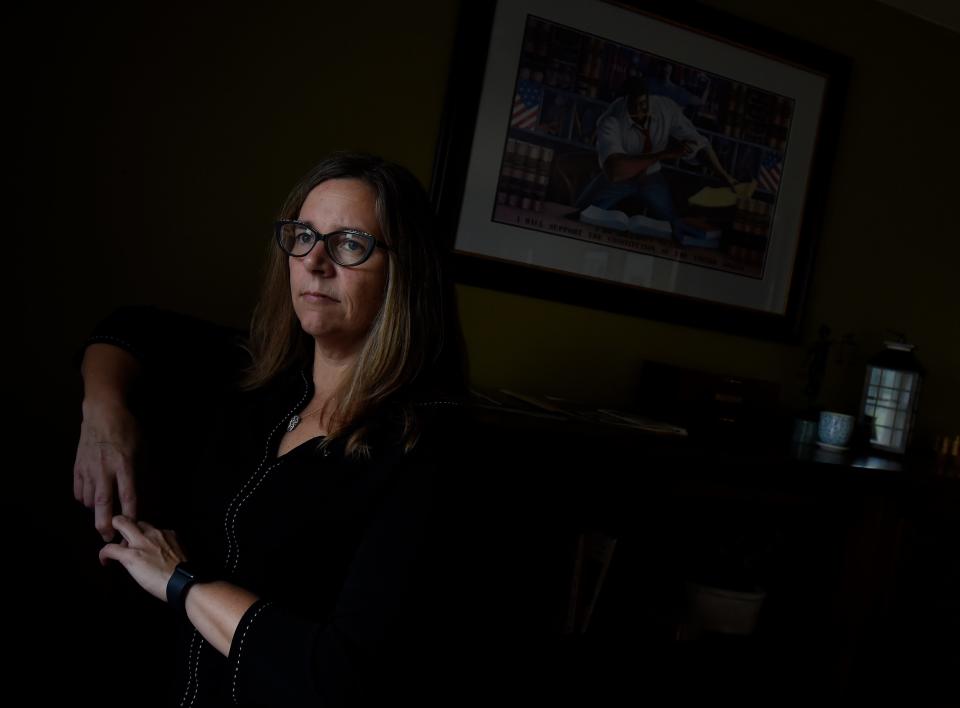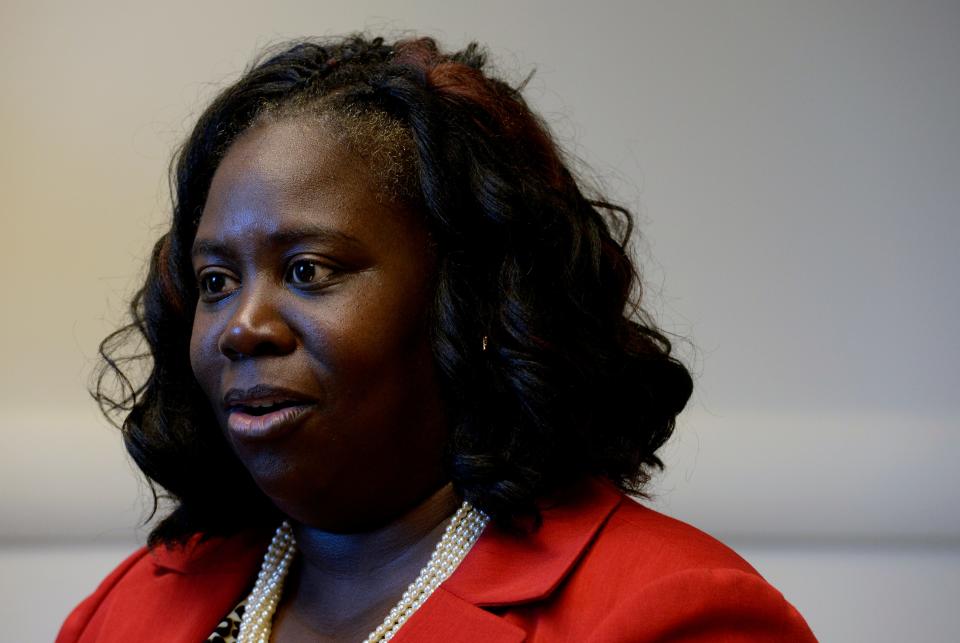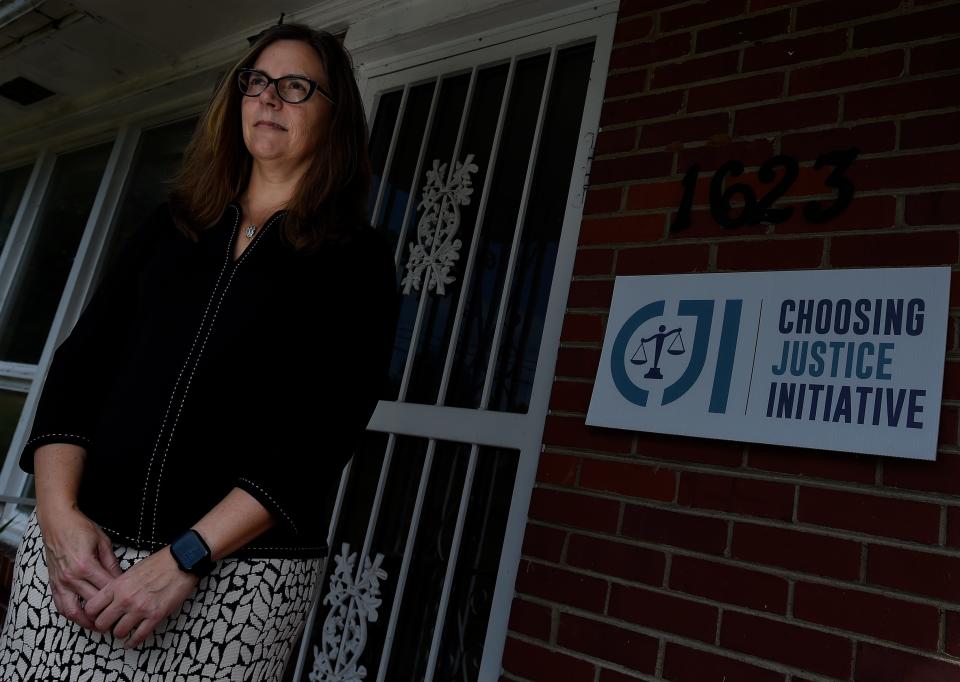Why Tennessee's system appointing lawyers for poor defendants is at 'breaking point'
Nashville attorney Ryan Davis stood before Judge Robert Bateman inside the Robertson County Courthouse earlier this month to make an unusual argument.
Davis hadn't necessarily chosen to be there. Earlier this summer, Bateman appointed Davis to represent an indigent defendant, someone who couldn't afford to hire an attorney.
Davis did not volunteer for the appointment, and he wanted Bateman to remove him from the case.
His argument? Tennessee’s indigent defense reimbursement rate, the lowest in the nation, is so paltry it amounts to a theft of services from attorneys, who are at regular risk of losing money when appointed to the cases.
The rate, $50 an hour for non-capital cases, has only been raised $20 in the last 42 years, despite widespread calls to increase the rate and a 2017 task force recommendation for the state to pay out between $75 and $125 per hour.

For Davis, the hourly rate and a low case cap would mean he couldn't cover the overhead costs of his office, where he employs three associate attorneys and a paralegal.
Attorneys and judges in Tennessee say the low rate is squeezing the state’s judicial system to a “breaking point,” with judges scrambling to find attorneys for the cases that lawyers are hesitant to take on.
Mark Fishburn, a retired Davidson County Criminal Court judge and Nashville School of Law professor, said the problem has “festered” for a decade and continues to worsen.
“The obvious problem with low compensation is the increasing difficulty in finding experienced attorneys to accept appointments, particularly complex cases where their experience is invaluable,” Fishburn said.
Judges increasingly rely on “less experienced” attorneys who take on large caseloads, Fishburn said, but even that pool of of willing attorneys appears to be shrinking.
Davidson County Juvenile Court Judge Sheila Calloway has a team regularly working the phones to find attorneys able to take appointments, but she still spends time in external meetings “begging” attorneys to take just one case. Calloway sees complicated abuse and neglect cases in her courtroom, which often require multiple attorneys to represent individual parental and child interests.
“I can’t remember the last time the attorney rate got higher, but can you imagine living in Nashville making the same thing you were making 30 years ago?” Calloway said. “I think there’s a lack of understanding on the part of our legislature on how important this is.”
Calloway feels the system is nearing a "breaking point."
“It’s unfortunate because we are struggling to keep up with federally mandated time frames because we are lacking attorneys who are able to step up and take the cases," Calloway said.

Every state in the country has an indigent defense system set up to fulfill the constitutional right of legal representation in criminal court. Tennessee, like many other states, funds a public defender system and has steadily raised annual salaries in these offices, with a current payscale ranging from $63,000 to $167,000.
But public defenders can’t take some cases, particularly in conflicts such as when two people are charged in the same criminal case, and an appointed lawyer must step in.
David Carroll, executive director of the Sixth Amendment Center, said an underfunded indigent appointee system sets up two different systems of justice that are often assigned at random.
Earlier this year, another Nashville attorney Jodie Bell made a similar argument in an ongoing homicide case, arguing the indigency system violates her client’s constitutional right due to “a substantial disparity and unfair allocation of resources.”
“Why should the level of justice you receive depend on which arbitrary system you’re sent to?” Carroll said.
Dawn Deaner, former Nashville public defender and current executive director at the Choosing Justice Initiative, feels the system is in the worse shape "it's ever been."
“Lawyers are becoming part of the disaffected class here,” Deaner said. “I think judges, too, are frustrated. They look around their court rooms, they want people to have good lawyers, and they can’t find lawyers to appoint.”
How Tennessee fell behind the rest of the nation
In 2015, the Tennessee Supreme Court appointed an Indigent Representation Task Force to study the issue. The high court oversees the Administrative Office of Courts, which administers the indigent defense system.
The task force in 2017 recommended, among other items, raising the hourly rate to at least $75 but up to $125 and eliminating case caps.
The Administrative Office of Courts increased an out-of-court reimbursement rate from $40 to $50, but the task force’s recommendations never materialized. The office submitted a $20 million budget request for fiscal year 2019 and received $9.7 million from the General Assembly.
In subsequent years, both the Administrative Office of Courts budget ask and the General Assembly’s appropriations have fallen under the 2019 request. In fiscal 2022, the the office requested $8.9 million and received $5 million. In fiscal 2023, it requested $5.7 million and received $3 million.
“The AOC is appreciative of the impact and significance of the work appointed attorneys provide to those who have a legal right to counsel, including children in need of a guardian ad litem,” said Barbara Peck, the office's communications director. “These attorneys serve a critical role in our judicial system. Over the past several months, the AOC has actively engaged in efforts to analyze available data and collect anecdotal details that will inform discussions about any future budget requests to increase appointed attorney compensation.”
For Deaner, the buck stops with the Tennessee Supreme Court. Deaner points to a rule stating appointed attorneys should receive “reasonable” compensation for their services.
“The Tennessee Supreme Court is the author of the rule, they set the rate, they’re the ones who decide the rate is reasonable, and they’re the ones charged with getting more money to support the system,” Deaner said.
Carroll called the Tennessee Supreme Court's oversight of the indigent system a “huge conflict of interest.”
“The states that have been able to increase their rates tend to be the ones organized under a statewide commission, generally under the executive branch,” Carroll said. “Judges are typically not good legislators or good advocates to advocate for pay raises for the system.”
'Insufficient rate'
In Robertson County court, where requests for indigent status forms lay scattered across a desk in front of Bateman’s courtroom, the judge acknowledged that he was in a “dilemma" after Davis argued his involuntary appointment created an "unreasonable financial burden."
“The court agrees that the reimbursement rate is insufficient,” Bateman said.
Bateman ultimately removed Davis from the case, as the attorney requested. But Bateman said he was removing Davis not for the reason he argued in his filing, but because he believes all attorneys have an “obligation” to accept appointed cases.

Though Bateman said he didn’t take “any pleasure” in it, the judge planned to refer Davis to the Board of Professional Responsibility, the Tennessee Supreme Court's disciplinary arm, suggesting Davis’ reticence to take the case amounted to an ethical violation.
Davis argued that unspoken obligation to accept indigent cases is an unfair burden on a certain class of lawyers. Davis was unknowingly appointed to the case in question after representing a different client in Bateman’s court, and he argued all members of the Tennessee bar are not being saddled with the same responsibility.
For Deaner, the situation strikes her as a “concrete example of a two-tiered system of justice” the state is creating.
Deaner points to the Tennessee Attorney General’s office, which has continually grown its budget for staff attorneys while also retaining external attorneys on contracts paying out hourly fees as high as $400
“What I care most about is not how much money lawyers are making,” Deaner said. “What I care about is if people who are poor who are charged with a crime can get effective representation. The reality today is they can’t. They can’t because there are very few lawyers taking these cases any more, because they lose money.”
Reach Melissa Brown at mabrown@tennessean.com.
This article originally appeared on Nashville Tennessean: Tennessee court-appointed lawyers: System at 'breaking point'

